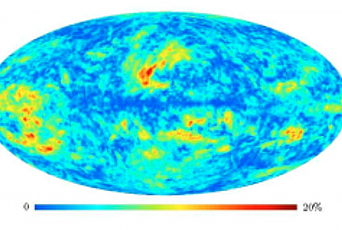The IAS Questionnaire: David Spergel

The theoretical astrophysicist and Princeton University professor is well known for his work on NASA’s 2001 Microwave Anisotropy Probe—he conceptualized the mission and deciphered the radio telescope’s data to measure the age of the universe, the shape of the universe, and the abundance of ordinary matter, dark matter, and dark energy. A 2001 MacArthur fellow and fall 2014 Visitor and former Member (1985–88) in the School of Natural Sciences, Spergel received the 2015 Dannie Heineman Prize for Astrophysics with Marc Kamionkowski for their investigation of the fluctuations of the cosmic microwave background, work they did when Kamionkowski was a Member (1991–95) in the School of Mathematics.
What makes you curious? I think that we are all curious. I have been fortunate to have the opportunity to have the time to explore some of the questions that have fascinated me.
Whom do you most admire and why? Galileo had the insight to point his telescope at the moon and then at Jupiter. He discovered new worlds and reshaped not only astronomy but our understanding of our place in the universe. He actively popularized his results, did both theoretical and observational work, and stood up (and suffered) for his beliefs.
Outside of your own, which field interests you most? I have always been fascinated by history and prehistory. I am fascinated by how humans have responded (or failed to respond) to challenges in the past.
How do you determine your focus? I try to identify important problems where I am likely to have a significant impact. Since there are many bright people working in astrophysics, I try to identify problems where I have a different perspective, access to new data, or a set of new tools that let me address the question in a novel way. I try to avoid areas where other scientists are doing very similar things with similar approaches.
What is the most surprising thing you’ve learned? Our universe is remarkably simple and remarkably strange. With only a handful of numbers (the universe’s age, the density of atoms, the density of matter, the amplitude of the variations in density and its scale dependence), we can describe all of its basic properties. Yet, the universe is very strange: atoms make up only 5 percent of the density of the universe. Dark matter, most likely composed of a yet undiscovered new particle, comprises most of the mass in our galaxy. Most of the energy in the universe is in the form of dark energy, energy associated with empty space.
How do you free your thinking? I need to first get away from distractions and set aside a block of time to read and focus on a topic. I then find that I get my best insights a few days or weeks later when I let my mind wander. This can happen when I am out running, in the shower, or just relaxing. I try to avoid thinking and driving.
What question would you most like answered? Are we alone? Is Earth the only planet where life originated? Is there intelligent life elsewhere?
How has the Institute influenced your perspective? When I was a long-term member at the IAS, John Bahcall helped shape my approach to science. John stressed the importance of addressing important questions, aiming for clarity, and staying close to the data. John contributed a great deal to the astronomy and physics community through his advocacy for science, his efforts to enable compelling projects, and through his role as a mentor. While he is no longer with us, he remains one of my role models.
Hermann Weyl, who served on the IAS Faculty from 1933 until his death in 1955, once said, “My work always tried to unite the truth with the beautiful, but when I had to choose one or the other, I usually chose the beautiful.” If you had to choose between truth or beauty, which would you choose and why? Truth. The universe is the way that it is, not the way that we want it to be. Our understanding of the universe’s beauty is incomplete. We often lack the deeper understanding needed to see the underlying beauty.
What is the purpose of knowledge? Knowledge both deepens our appreciation of our universe and the human condition and enables technologies that improve the quality of our lives.
What have you ignored that turned out to be crucial? I assumed that empty space was truly empty. Observations have shown that empty space is filled with dark energy. I had missed 75 percent of the universe.


